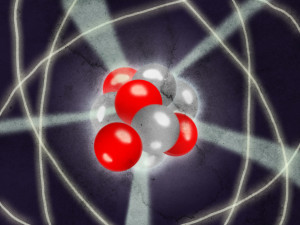
A Single Atom
For some time I have wanted to write a few shorts lessons on how to, not just survive chemistry class, but to actually understand it. I have finally sat down to do so. After studying chemistry in-depth in college, getting a master degree in environmental and chemical engineering, and teaching chemistry for a couple years, I have come to the conclusion that the topic of chemistry is often over-complicated with complex formulas and equations and the instruction of the subject has become unattached from reality. In this way, both teachers and students forget to sit back and appreciate the true depth and beauty of a topic that can help one to grasp so much about the world around them.
Have you ever wondered why the water we drink is a liquid and the air we breathe is a gas? Why is it not the other way around – why is the air not a liquid and the water not a gas? Or why is the cup we use to transport the water from the tap to our mouth a solid? We put gasoline into our car and then it runs for miles and miles. We look into the sky and see so many colors, but why? I hope that by explaining some of the most fascinating, and yet practical, concepts within chemistry (in the way that I understand them), that you will develop both an understanding of, and a passion for, chemistry. This will not just help one to make better grades in school, but can provide a practical basis for understanding the world around us!

Wow, this is really interesting!
John this is awesome! I’m excited to read what is to come. I love it when intelligent individuals de-mystify science for me and then I can understand it and realize that I really like science!
Thanks for your feedback Ben and Rachael! I will definitely keep writing! I think about simple ways to explain things like this all the time, but I if I don’t record it somehow I forget them. Hopefully, these can used to as bite-sized nuggets of information to get people interested in science and help learn the topics with just a couple short lessons a day.